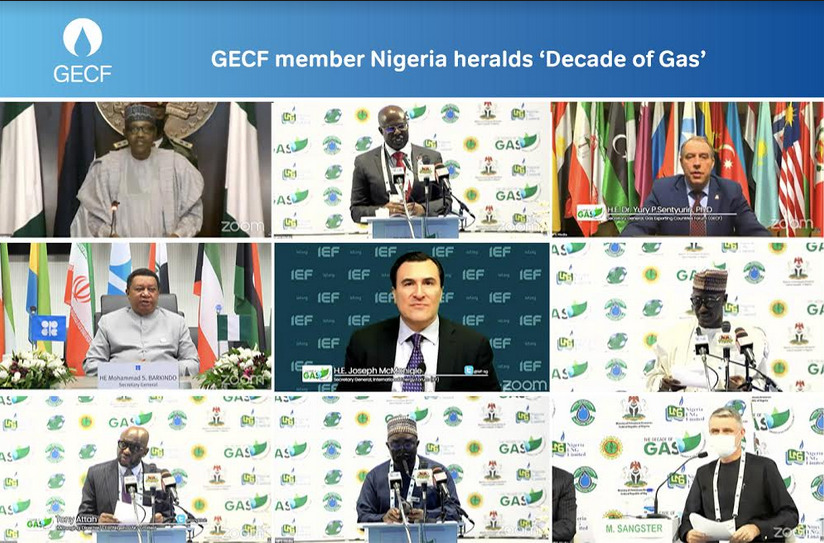Doha, QATAR – 30 March 2021: Gas is a source of energy, gas is transport in vehicles, petrochemical in feedstock, power in manufacturing and industry, food through fertiliser, and now it is the central plank in the world’s seventh most populous nation and a pillar member of the Gas Exporting Countries Forum (GECF), Nigeria, as it transforms its energy landscape to run entirely on natural gas.
This was announced at a high-profile blended the ‘Decade of Gas’ event in Nigeria, held with the theme of ‘Towards a gas-powered economy by 2030’ under auspices of HE Muhammadu Buhari, President and the Minister of Petroleum Resources of Nigeria, who was joined by energy leaders from around the world, including OPEC, International Energy Forum, and International Gas Union.
“To actualise the dream of transforming Nigeria with its massive natural gas resources requires the collaboration of government with the necessary stakeholders; the international oil companies, the indigenous oil companies and financial companies … to fully utilise our gas resources to uplift our economy,” said President Buhari, highlighting the importance of gas industry for significant revenue generation, in addition to over tens of thousands of job opportunities for Nigerians up to 2030.
Sharing the vision of the Nigerian leadership, HE Yury Sentyurin, GECF Secretary-General in his goodwill address noted that “working closely with our esteemed Nigerian counterparts, I can testify that the energy sector in Nigeria is witnessing perhaps a golden era of sustainable growth and is being made future-proof for the upcoming generations of Nigerians,”
The development of the energy sector in Nigeria will bear fruit not only for West Africa’s largest nation but also for the entire continent, where currently 789 million people have no access to clean cooking and 535 million with no access to electrification, said HE Sentyurin, representing the Forum which counts six out of 19 members from the African continent.
Nigeria is blessed with abundant reserves of both associated and non-associated gas, estimated to be in excess of 202 trillion (standard) cubic feet (tcf). However, geologists believe that there is a lot more gas to be found in Nigeria, potentially up to 600 tcf, if companies deliberately explore for gas, as opposed to finding it while in search of oil.
Proving the 600 tcf reserves will move Nigeria to fourth position in the world from currently the ninth largest natural gas reserve-holder in the world. The country is the largest oil and gas producer in Africa and the sixth largest supplier globally of liquefied natural gas (LNG) in the world. Nigeria is a member of both the GECF and OPEC.
The GECF is a prominent advocate of energy solutions in Africa. Its 2019 Malabo Declaration at the outcome of the 5th GECF Gas Summit of Heads of State and Government in Equatorial Guinea, crystallised the Africa focus clearly by stating that “To promote the GECF cooperation with African countries to use gas as the core source of energy in their development programs and climate change policies, with the aim to overcome energy poverty, enhance development and to mitigate CO2 emissions.” Last December, the Forum signed an MoU with UNESCO with a particular focus on empowering Africa.
“Africa is many Africas together. For example, when we talk about a just and fair energy transition in Africa, it is important to note that the answers that parts of Africa require might differ from the global north. But we know that investment in cleaner energy, such as natural gas, which according to our latest projections is set to grow from presently 6% to 10% by 2050 in production supply from Africa, would increase national GDPs, jobs, and create prosperity,” noted GECF’s spokesperson.
“And that is a narrative we must take forward in terms of making sure that Africa advances in tandem with the world.”
Nigeria’s ‘Decade of Gas’ initiative succeeds the 2020 ‘Year of Gas’ declaration, which played a forerunner to the decade-long ambition and saw the government unveil a range of projects, including the 614kms-long Ajaokuta-Kaduna-Kano (AKK) pipeline at a cost of $2.8 billion to connect the eastern, western, and northern regions of the country, and the construction of $10 billion LNG Train 7. Policy changes, such as gas flare commercialisation and the codification of the Nigerian Gas Transportation Network, are in addition to these projects.
HE Timpire Sylva, Nigeria’s State Minister for Petroleum Resources said: “It is no longer acceptable that despite the country’s vast natural gas resources the gap between electricity supply and demand is huge. We must deal with the energy poverty in this country, we must find a way to unlock the natural gas potential of this great nation and drag over 120 million people out of energy poverty.”
The day-long conference of ‘Decade of Gas’ was a prelude to the 4th Nigeria International Petroleum Summit, which will be held on 6 June 2021 in Abuja and through remote participation.


